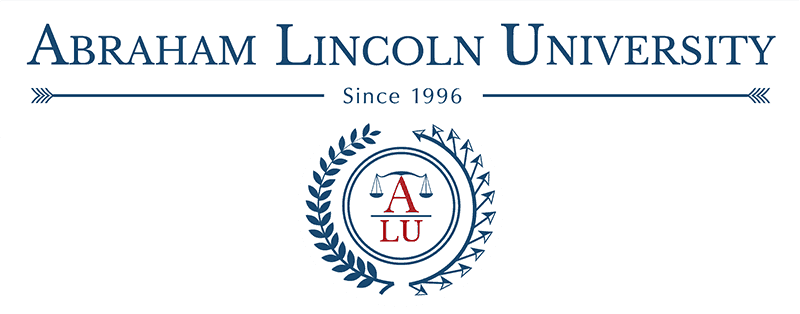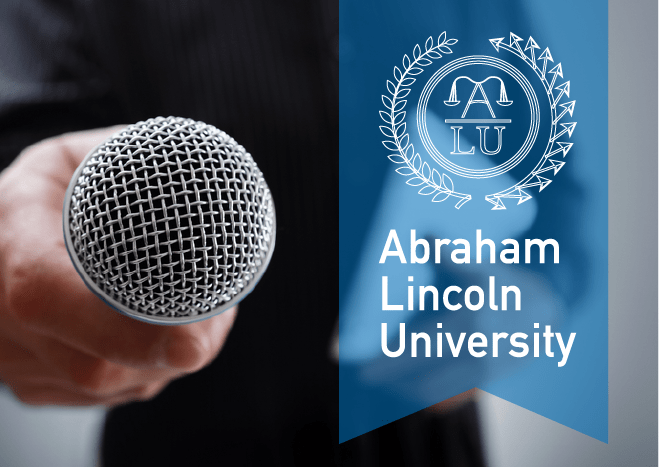I was honored to interview Dr. Jonathan Kramer, Esq., JD, LL.M, DLP, one of our awe-inspiring ALU alumni (2001), about his time as a law student and all of his adventures since graduating. Jonathan Kramer serves on Abraham Lincoln University’s Advisory Committee and on the Academic Program Advisory Board for the Juris Doctor. He offers input about curricular needs and improvement for the law program.
Jonathan is also one of ALU’s alumni speakers who has delivered commencement speeches, advised and inspired new students at law school orientation events, and helped to create ALU’s alumni association, which he told me that, a while back, he “started without permission.” During his legal studies, he was even the one who registered alu.edu as the school domain.
He now has many degrees under his belt, is the Founder and Principal Attorney at Telecom Law Firm P.C., and is a leader in his field.
What made you pursue a doctorate degree after law school?
The law degree to me was never the end of my education. My law degree from ALU opened doors to continue my education and receive my masters in telecommunications law and information technology [and my doctorate].
I completed my masters of law degree in 2013 and I was still hungry. So to feed my appetite I applied for and was accepted into the Doctor of Law and Policy program in Northeastern University in Boston. I began that program in 2014. As a side note – between the time I graduated from Strathclyde with my masters of law and by the time I started my studies at Northeastern, I was looking around for something to do, and I studied for and passed the bar in New Mexico. So I’m licensed in New Mexico as well as California. And now I’m looking at doing post-doctoral work at Northeastern.
None of this would have been possible without achieving my JD at ALU. That opened so many doors.
As you might guess, I’m kind of an education junkie. And frankly, as a lifelong learner and education junkie, when I’m dealing with other attorneys, I can instantly tell the ones who have continued their education after they passed the bar exam and those who simply have decided to stop.
What made you decide to go to law school in the first place?
I had years of experience as a telecommunications engineer and as an expert witness. I was teaching continuing education for attorneys on telecommunications law even before I went to law school. And I served as the federal government’s expert witness in a case styled as Playboy vs. the United States, which was a huge telecom act case on cable TV scrambling adult channels. When I came back from testifying in that case, my wife said to me, “You know, you’re an idiot.” And I said, “Today?” And she said, “Look, you’re teaching attorneys the law, you’re ghosting legal briefs, you’re doing legal research—why don’t you have a license?” And apparently I didn’t have a good answer that day. The next words out of her mouth were, “And I found a law school you can go to.” So I became a member of the second class at ALU, in 1997, and pursued the degree over the four years. I graduated with honors.
Why did you choose an online law school?
I didn’t—I picked a law school that met my needs as a working professional. I took almost all of my classes in person because it fit my particular study style.[1] When I describe ALU to people, I don’t describe it as an online law school because that’s really a misnomer. ALU is a law school that adapts to the way the student wants to learn. If you want to do it online, you do it online. If you want to do it in person, you do it in person. Or if you want to blend it, you blend it. I would describe it as one of the very few adaptable law schools.
What was your experience at ALU?
It was a wonderful four-year history lesson. Let me explain why. Law is not either sterile nor exists in a vacuum. Law is a product of what society is doing at a particular time and how it reacts to things. So as you study the law, you’re also studying the history of what’s going on in the world at the time the laws were created. A great example is the law of burglary, which is the breaking and entering of the dwelling of another at night with the intent to commit a felony or larceny therein. Pretty dry stuff—until you know that that law was created in common law England and it was designed to raise the stakes of breaking into shops and so forth. And the result of the law was that shopkeepers would move into or just above their stores so that breaking into the store became a capital crime. And that’s why you had storekeepers living above the store. It was to fully put the weight of the law behind where they chose to live.
When you study law, you’re studying history, you’re studying sociology, you’re studying current events that happened hundreds of years ago—all of that put the law into motion. So my studies were really a splendid exploration of history, sociology, business, and it made the study of law very alive for me.
How are you using your law studies now in and out of your practice?
Well, it’s amazing how often areas of law that you would have sworn you would never use in your practice come into play. The practice of law is not isolated to one field. A lot of my work as a telecommunications lawyer is in the property area. Other portions get into contracts law. Other portions actually touch on tort law simply because sometimes accidents happen. Resolving all of those issues requires me to deep dive back into the legal learning I got at ALU so that I can put all those pieces together and solve the puzzle for my client. Simply knowing a particular area of law is a good starting point, but the fully rounded attorney will think of other aspects of law that will surprisingly come into play frequently in the day to day practice of law.
With all these studies and practice, how do you sustain energy and find a balance?
People put a lot of effort into work-life balance. But [not] if your work is wonderful and rewarding, as is mine, and your life is based on helping people, as is mine, and you have a supportive family, as I do. They understand what drives and motivates me. But as a practical reality in my own career, I work hard but never so hard as to not have time for family. I am the head of a small law firm (six attorneys in my law firm and two offices, one in LA and one in La Jolla) and it’s a requirement of the law firm that no one works past six o’clock at night and none of the associates are allowed to work on the weekends. That breaks every lawyer rule there is, but by having that rule and enforcing it, I have people who love coming to work as much as I do because they know that this is a firm that will give them the balance they need to have full, developed lives, not just lives devoted to serving their partners.
What advice would you give to current and future ALU students?
Don’t take the study of law lightly—it is a serious pursuit that requires serious focus but once you figure out what it is, you risk falling in love with the law as have I. If you fall in love with the law, it will never be the drudge that many lawyers experience who went into the law without a clear reason or focus and without a clear plan. So my advice is to come into the law for a good reason and remember that reason as you’re studying. Study to achieve your goals, and then actually pursue the goals you want, rather than the goals someone else wants for you.
Enjoy the law. Use your powers for good, not evil. I mean that half-jokingly but only half, because I see lawyers out there who forget the noble calling that is our profession. I’m much happier when I’m helping people solve problems that are important in their lives. It’s personally satisfying to me. And it should be the goal of every [law] student. You’re going through this to serve, benefit, and improve society. That truly is what the law can do. It’s not meant to be a blunt instrument. It’s meant to be a surgical tool that cures problems, not compounds them.
[1] “In-person” refers to ALU’s unique feature as a distance learning institution, where students can attend various lectures by attending class in a classroom at ALU’s Los Angeles office during live lecture times. In 2016, ALU still provides this “in-person” experience to students for various lectures that are simultaneously being held in a classroom in Los Angeles and streaming online to an online audience. This is offered purely as an option to ALU law students.






